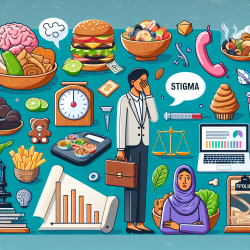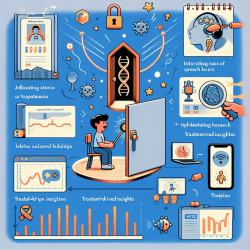Understanding the Ethical, Stigma, and Policy Implications of Food Addiction
The concept of food addiction has been a topic of significant debate, raising questions about its ethical, stigma, and policy implications. For practitioners, especially those working with children in educational settings, understanding these implications is crucial for effective intervention and support. A recent scoping review titled "Ethical, Stigma, and Policy Implications of Food Addiction: A Scoping Review" provides valuable insights that can guide practitioners in making informed decisions.
Ethical Considerations
The review highlights the ethical challenges associated with food addiction, primarily revolving around individual responsibility. Two sub-themes emerge:
- Personal Control, Will Power, and Choice: The tension between personal responsibility and the medicalized view of food addiction is significant. Practitioners should be aware that framing food addiction as a brain disease might reduce blame but could also lead to coercive practices.
- Blame and Weight Bias: The attribution of blame varies, with some blaming individuals and others blaming the environment or food industry. Practitioners should consider these perspectives when designing interventions.
Stigma Implications
Stigma is a critical issue in the context of food addiction. The review identifies several key points:
- Impact on Self-Stigma and Stigma from Others: While a food addiction model may reduce external stigma, it can increase internalized stigma, affecting self-efficacy and eating behaviors.
- Differential Impact of Substance Use Disorder vs. Behavioral Addiction: How food addiction is classified can influence stigma. Substance use disorder framing may reduce stigma, while behavioral addiction framing might increase it.
- Additive Stigma of Addiction Plus Obesity/Eating Disorder: Food addiction could create a double stigma, compounding the stigma of obesity and addiction.
Policy Implications
The review draws parallels between food addiction and the tobacco industry, suggesting potential policy interventions:
- Reducing Access to Addictive Foods: Policies could limit access to hyperpalatable foods, especially in schools, to mitigate addiction risks.
- Food Taxation: Similar to tobacco taxes, taxing high-calorie foods could reduce consumption, although this approach has its challenges.
- Limiting Advertising for Addictive Foods: Restricting food advertising, particularly to children, could prevent early exposure to addictive foods.
Moving Forward
For practitioners, these findings underscore the importance of nuanced approaches to food addiction. Understanding the ethical, stigma, and policy dimensions can enhance the effectiveness of interventions and support. Practitioners are encouraged to delve deeper into this topic and consider the implications for their practice.
To read the original research paper, please follow this link: Ethical, Stigma, and Policy Implications of Food Addiction: A Scoping Review.










